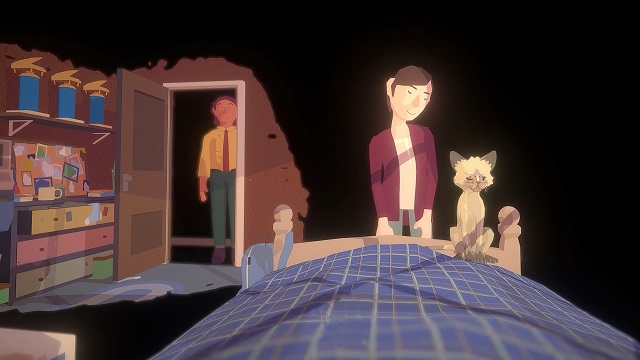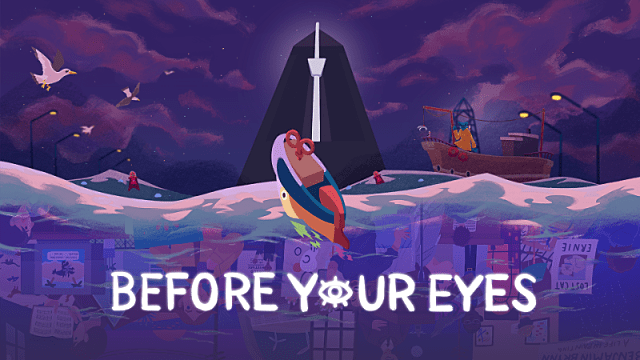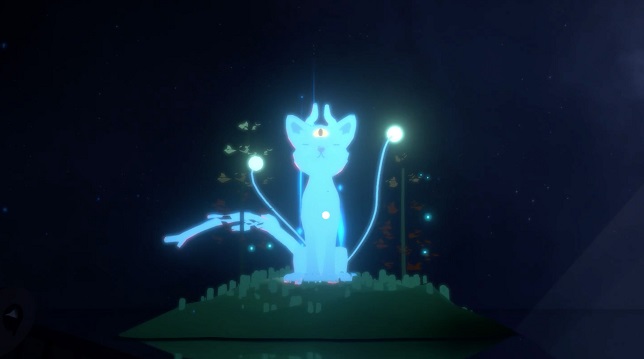Though several weeks and a few major video game launches remain on the 2021 release calendar, I can’t imagine any of them affecting me as much as GoodbyeWorld Games’ Before Your Eyes. It arose out of nowhere for me after I learned of it via word-of-mouth in the springtime from another outlet’s glowing review.
As it turns out, that word-of-mouth would continue to spread like wildfire following its release in April. Today, Before Your Eyes is widely considered a surprise Game of the Year candidate among those who have played it. That’s owed to its novel gameplay concept of webcam-enabled blinking to advance time, as well as its gut-punch of a story that seems to devastate anyone who finds it.
Recently, I was able to chat with two of the game’s developers, Lead Writer and Creative Director, Graham Parkes, as well as Game Director and Composer, Oliver Lewin. During our hour-long talk, we touched on the seven-year journey of Before Your Eyes, whether its intended emotional turmoil is ever numbed by working so closely on it, and more.
*Note: There are spoilers ahead! If you haven’t played Before Your Eyes, do that first, then come back.*
Before Your Eyes is just a 90-minute game, and yet it took seven years between concept and launch on PC and Mac earlier this year. The project, Parkes told me, was born out of a senior capstone at USC by Goodbyeworld Games founder, Will Hellwarth. Hellwarth plotted the initial concept of telling a story where time advances when the player blinks in an introduction to game dev class. Parkes and Lewin joined Hellwarth to mold the concept into something playable.
Then a funny thing happened: The game, back then titled Close Your, started to win awards. First, a Developer’s Choice Award at IndieCade 2014, then Best Student Game at Independent Games Festival the following year.
Together, the group felt like they had their “entry into the scene,” Lewin said, and the fact that they found themselves “brushing shoulders with a lot of people that we looked up to was very inspiring. Like, I remember seeing Austin Wintory walking around, like, ‘Oh, cool. One of the coolest composers there is.'”
The early successes helped keep the game afloat, at least as an idea.
“It’s not like we were seven years full-time working on this,” Parkes told me. “Off of those two awards, we said, ‘We don’t want to stop working on this thing.'” But its small beginnings meant people had to move on to some extent, find other work. “We wanted to keep it alive. So we did a Kickstarter.”
The 2016 Kickstarter looked like a success — it finished about $10,000 over its base goal of $25,000 in pledges — but Parkes said the team bit off much more than it could chew, “like a lot of Kickstarter projects.”
“The plan was to kind of complete it on nights and weekends and kind of, you know, do the real indie bootstrap thing with it,” he added. But things always got in the way. After receiving financial investment in 2018, presumably from eventual publisher Skybound Games, the team was able to hire people on a full-time basis and commit wholeheartedly to the already four-year-old project.
Three years later, the game would launch after two name changes — the second name, Coda, was already earning buzz as an unrelated indie film, causing the game devs to ditch the name. Poetically, the project that would come to be known as Before Your Eyes once more took home some hardware from IndieCade, the 2021 Jury Prix.
With the award show serving as unintentional bookends to the game’s evolution, I asked the pair how they think about its success this year after they spent the better part of a decade working on it, especially as Before Your Eyes continues to garner Game of the Year consideration from countless outlets.
“I never expected that we’d be in a position where like, every day, there’d be emails from people sometimes that are quite lengthy,” Lewin told me. “And some of them are very personal. And so we’re grateful for that, as creators, you know, the generosity on behalf of some of our fans telling us why it resonated with them so much.”
The developers also spoke to going down the rabbit hole of fan reactions given that Before Your Eyes is so stream-friendly, which I myself know very well, as I’ve made a months-long habit out of watching streamers play through the final few heart-wrenching moments.
“It’s kind of a treasure trove, you know,” Lewin said.”Whether it’s YouTube comments or the [Twitch] chat room, or just listening to streamers kind of express their opinions as they’re playing. Because you learn new things, or you’re reminded of things that are years old, that you kind of forgot about.”
“It was a pretty magical first week, like, Twitch became kind of where we all were living,” Parkes added, contrasting the launch of the team’s first game with that of a movie from his filmmaking background. “Even if you make a movie, you go to a screening. It’s not like you have a camera on every audience member’s face. There’s something about putting a game out in the world where you get to literally see the effects that your work has, like on a micro-level on people’s emotions.”
“I don’t think we expected it,” said Lewin, sharing an anecdote that captured the game’s earliest, and ultimately trendsetting, hours in the public.
“Right after it launched [at 5 a.m. local time], one of us checked Twitch and was like, ‘Oh, there’s someone streaming the game.’ And we were like, ‘This is amazing. We get to watch someone play it. Let’s see if there are any bugs.’ Then kind of towards the end, it was like, ‘Wait there’s another person playing. I’m gonna go check out that person’s stream.’ And it was kind of non-stop, and we all just kind of got addicted.”
While that launch period was one of elation, working on such a sad game for so many years might eventually numb one to the experience they’re trying to craft, but the duo explained how they were able to rediscover that somberness at various moments during development.
“It definitely comes in waves. You lose your objectivity, and then you get hit by it fresh again,” Lewin told me. “Like when you do the recording sessions, you’re sitting in there with the headphones on and you hear the actors bringing life to it in a way that you hadn’t foreseen or been prepared for. It’s like it’s hitting you: ‘Damn, you know, I was just in this funeral scene, tweaking things for hours, and I’m feeling sad.'”
Parkes echoed the sentiment and commended the performances from the pair of real-life friends that portray the story’s parents, Sarah Burns and Eric Edelstein. “I just sort of knew that whatever I wrote, we’d go into a very kind of, you know, safe space, and we’d be able to workshop it, and they’d bring themselves to it,” he said, revealing that he wrote the parts specifically for the pair.
But how does one write characters who know they will outlive their child? As a parent of two, I likened the experience to watching a horror movie, where I am blanketed by the fact that it’s all for show. I can grapple with it in that moment, then return to my kids, who are fortunately healthy. But for the writer, it’s a long and arduous task to deliver those crucial scenes with the necessary devastation, even as Before Your Eyes tries to let a little light in too.
“When you realize that the story is going there, you kind of, as a writer, you get a little scared. ‘Am I gonna be able to pull this off?'” admitted Parkes, who added that his own time spent sick and bedridden as a kid was there for him to draw from, even as his experiences were never as dire as protagonist Benjamin Brynn’s.

Though so much can be said about its inventive webcam gameplay, for me the greatness of Before Your Eyes is best represented in one late scene.
When you are about 10 minutes away from Benny closing his eyes for good, you rejoin him and his ferryman companion. The ferryman rows him through a non-denominational version of an afterlife, toward a Gatekeeper that resembles Benny’s childhood pet. The ferryman, who will be judged as well based on the strength of the stories he brings to the gatekeeper, bellows out the true story of Benjamin Brynn for the first and only time.
“Gatekeeper, before you sits the soul of a child who died before he could grow old.” He continues, but it’s that exact moment that hit me in the gut when I first played it. It’s torn me up all year, really, and it’s that moment I’ve sought out regularly online like some sort of cathartic high. I’ll find a streamer’s VOD and cut to the 80 or so minute marker in the playthrough. Then I watch as they fall apart on camera, just as I did when I reviewed the game back in April.
For me, that moment is the most beautiful part, because it’s when we can no longer evade the story’s tragic reality. Some players can surely see disaster coming but don’t yet have it all cleared up, while others are certainly less sure what they’ve seen to that point. But in that moment, there are no more mysteries.
“The way Graham wrote [the ferryman] is that he’s also on his own kind of journey,” Lewin said, “because he’s nervous about his performance and his kind of big moment on stage, so to speak. And while you’re kind of full-throttle, recognizing the realities and the kind of tragedies of the story at that moment, he’s kind of coming into his own.”
“[Voice actor Steven Friedrich] played it with no preciousness,” added Graham, “no sense of underlying underlining the sentiment with that character. I do think that sometimes you kind of want to leave it up to interpretation. At that point, you just want to tell people what’s going on. And that might be a moment of that, where it’s just like, you know what’s been happening, but you haven’t maybe fully processed it, and then that line kind of helps you. It helps it sink in.”
There’s no alternate, happier ending in Before Your Eyes, which according to Google Trends, is not what many players hoped to hear. The story of Benjamin, through whose eyes we see from infancy until his death 11 years later, and with a host of imagined happier moments in between, ends when his unnamed terminal illness takes his life in his bedroom as he’s surrounded by his family.
Why end the game on such a brutal blow, especially when the story to that point offered some branching paths and was once envisioned to feature even more of them?
“This story was always going to end the way that it did,” Parkes told me. “Most games are about empowering you. And this is about taking power away. And it is sort of about humbling yourself to the fact that you’re gonna have to blink eventually, you’re gonna have to die eventually.”
“Tragedy is practice for what might befall us in life,” he added, quoting Aristotle. Thus Before Your Eyes is, as the team sees it, “a test run for death.”








Published: Nov 8, 2021 01:04 am